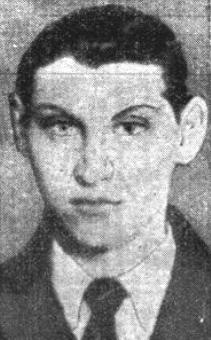Dido Kvaternik
This article includes a list of general references, but it remains largely unverified because it lacks sufficient corresponding inline citations. (March 2013) |
show This article may be expanded with text translated from the corresponding article in Croatian. (June 2013) Click [show] for important translation instructions. |
Eugen Kvaternik | |
|---|---|
 Eugen Kvaternik in 1934 | |
| Nickname(s) | Dido |
| Born | 29 March 1910 Zagreb, Kingdom of Croatia-Slavonia, Austria-Hungary |
| Died | 10 March 1962 (aged 51) Río Cuarto, Argentina |
| Service/ | Army |
| Years of service | 1941–1943 |
| Rank | Colonel |
| Unit | |
| Commands held | Ustaška nadzorna služba |
| Battles/wars | World War II |

Eugen Dido Kvaternik (29 March 1910 – 10 March 1962) was a Croatian Ustaše General-Lieutenant and the Chief of the Internal Security Service in the Independent State of Croatia, a Nazi puppet state during World War II.
Life[]
Eugen Dido Kvaternik was son of Slavko Kvaternik, a general in the Independent State of Croatia army and a member of the Ustaše, and Olga Frank, daughter of Josip Frank, a Catholic convert whose parents were Jewish.[1]
He instituted a regime of terror against Croatian Serbs, Jews, Gypsies and other "enemies of the State". In 1943, after a falling-out with Pavelić, the leader of the Independent State of Croatia, he and his father, Slavko, the Croatian Minister of War, went into exile in Slovakia, and after the war fled to Argentina. From Argentina, he directed activities against Josip Broz Tito. He reorganized Ustaše supporters and continued to publish actively. Yugoslavia's multiple extradition requests were all turned down, and Kvaternik was never tried. Dido Kvaternik died in a car crash in Río Cuarto, Argentina in 1962.[citation needed]
Family[]
Kvaternik met Marija Cvitković in 1941; the two married on 10 January 1942. The couple had three children: Slavko, Davor and Olga. Slavko later became a professor of political sciences in Argentina, and Davor became a cardiologist in Boston, Massachusetts. Olga died with her father in the same car accident on 10 March 1962. He was survived by his widow, Marija, and their two sons.[2]
References[]
- ^ Goldstein (2001, p. 585)
- ^ Milan Blažeković: Bio-bibliografski leksikon suradnika Hrvatske revije. Školske novine-Pergamena, Zagreb 1996, S. 262-263; ISBN 953-160-107-0
Bibliography[]
- Goldstein, Ivo (2001). Holokaust u Zagrebu. Zagreb: Novi Liber. ISBN 953-6045-19-2.
External links[]
- Eugen Dido Kvaternik profile, jusp-jasenovac.hr; accessed 28 October 2015. (in Croatian)
- 1910 births
- 1962 deaths
- Military personnel from Zagreb
- Croatian people of Jewish descent
- Croatian people of German descent
- People from the Kingdom of Croatia-Slavonia
- Croatian collaborators with Nazi Germany
- Croatian collaborators with Fascist Italy
- Ustaše
- Croatian military personnel of World War II
- Road incident deaths in Argentina
- Holocaust perpetrators in Yugoslavia
- Genocide of Serbs in the Independent State of Croatia perpetrators
- Romani genocide perpetrators
- Jewish fascists
- Yugoslav emigrants to Argentina